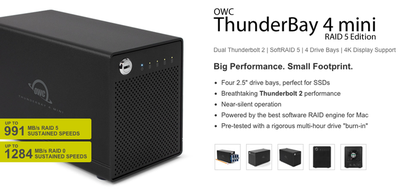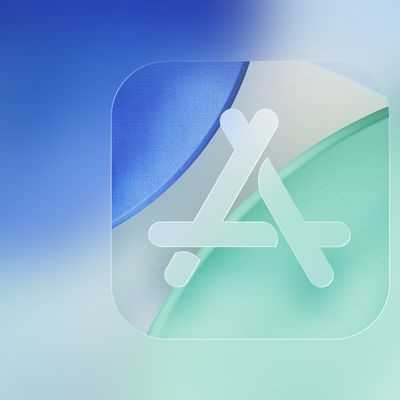OWC today expanded its ThunderBay lineup of storage devices with the new ThunderBay 4 mini and ThunderBay 4 mini RAID 5 Edition. These new portable RAID devices are designed for 2K and 4K video editing with fast Thunderbolt 2 performance and SSD support.
"Our new ThunderBay 4 mini is perfect for mobile workflows involving demanding applications and large mission-critical files," said Jen Soulé, OWC President. "The combination of RAID-ready capabilities and Thunderbolt 2 technology makes working with large 2K and 4K files easier, faster, and more flexible and affordable than ever before. Now users can get big performance in a small footprint - all in a portable, production-grade 4-Bay enclosure."
The ThunderBay 4 mini and mini RAID 5 Edition both include four 2.5-inch drive bays that are compatible with either HDDs or SSDs, allowing owners to build a storage solution suitable for their needs. The new ThunderBay minis also include Thunderbolt 2 transfer speeds of 1,284MB/s, the ability to connect multiple ThunderBays into a RAID array and OWC's signature drive "burn-in" reliability.

Similar to earlier ThunderBay models, the ThunderBay 4 mini is available in a base bring-your-own-drives model for $379 with configurations from 2 TB to 8 TB available at additional cost.
While the ThunderBay 4 mini and the mini 4 RAID 5 Edition share the same internals, the RAID version ships preconfigured for RAID 5 with support for RAID 0, 1, 4, 5, and 1+0. Pricing on the RAID model starts at $479 when you supply the necessary drives and climbs to $2,499 for the 4 TB SSD model.
Both the ThunderBay 4 mini and ThunderBay 4 mini RAID 5 Edition are available now at OWC's website. The larger desktop ThunderBay 4, introduced last year with support for 3.5-inch drives, is still available starting at $449 for the bring-your-own-drives configuration.





















Top Rated Comments
Actually, SoftRAID has done an absolute tremendous job with their implementation of RAID 5. There are several advantages of their software RAID 5 over hardware RAID 5.
1. SoftRAID is fully multicore aware and will take advantage of how ever many cores your machine has.
2. With the power of todays processors, the CPU overhead is so low as to be unnoticeable.
3. Rebuild times are a fraction of what they would be on a hardware RAID.
4. Because the software handles all the parity, disks do not need to be the same size, make, model or firmware, like they would in a hardware RAID.
5. Additionally there is no data loss if you want to resize the disk, in any of the RAID modes, even RAID 5.
There are a lot more benefits to SoftRAID than even I listed here. Definitely worth checking out for anyone who could benefit from a RAID setup.
There are comparable NAS and DAS products in the same price range that don't rely on your computer at all for raid parity calculation.
http://www.amazon.com/gp/product/B00LF87NBK/ref=pd_lpo_sbs_dp_ss_1?pf_rd_p=1944687402&pf_rd_s=lpo-top-stripe-1&pf_rd_t=201&pf_rd_i=B00HRKB2F8&pf_rd_m=ATVPDKIKX0DER&pf_rd_r=1HRY20QVBRB2ZPVPBS9C
There are tons of Thunderbolt portable bus-powered SSD's.
----------
Agree with all thee above, but I think what he means is how can someone justify $450 for a thunderbolt controller and hard drive carriage? The margin on this must be incredible.